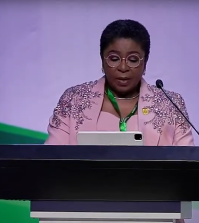Anti-corruption campaigner: “establishment corruption” threatens UK’s image overseas

The UK suffers from a “peculiarly British form of corruption” involving “the legalisation of things that look dodgy,” the executive director of Transparency International’s UK chapter has told Global Government Forum.
Speaking in an exclusive interview, Robert Barrington pointed to “a sense for the UK in particular that there’s a kind of establishment corruption: that the whole system is fixed in favour of a small number of people at the top who are the politicians, the senior businesspeople, perhaps the senior civil servants. And that’s quite hard for the UK to shake off.”
These perceptions weaken the UK’s credibility as a global leader in the battle against corruption, Barrington suggested – and the success of its 12 May International Anti-Corruption Summit will depend in part on whether those invited think “the UK has the credibility to be able to talk about it. I think governments that are inclined to do something on this will probably want the UK to go a bit further, particularly on [tax avoidance and evasion in] the overseas territories and the Crown dependencies.”
The UK generally scores quite well in global corruption metrics, coming out joint 10th of 167 countries in Transparency International’s 2015 Corruption Perceptions Index. However, Barrington noted that “when people outside the UK look at its ranking in corruption indices, they’ll say: ‘Yes, but you’ve got a political class drawn from a tiny number of schools; a political class that’s entirely in bed with the top of the banking sector, so that the bankers never lose’.”
The resulting cosy consensus within the British establishment, he argued, leads to “lots of borderline things which frankly shouldn’t be there. Things about the revolving door [between government and business], and political party financing, and lobbying. There’s no excuse for not sorting these things out, yet year after year they’re not sorted out.”
The UK’s Advisory Committee On Business Appointments (ACOBA) is a classic example, Barrington said. Established to monitor businesses’ recruitments of civil servants and politicians, the committee does no investigatory or compliance work and depends entirely on self-reporting: “It’s clearly a body that isn’t fit for purpose, and it’s just left to get on with being not fit for purpose,” he said.
Asked whether the establishment keeps ACOBA weak in order to prevent exposure of appointments that the public would see as corrupt, Barrington replied that whilst it’s impossible to tell, “this is the weakest possible system that could have been created to defend against corruption – and that must tell you something.”
Barrington called for greater transparency as a way to avert future corruption scandals and improve the UK’s image overseas, strengthening its ability to help lead international efforts to tackle corruption.
Click here for the full interview, or click below to watch Barrington’s five thoughts for better government
For up to date government news and international best practice follow us on Twitter @globegov
See also:
Robert Barrington, executive director of Transparency International UK: exclusive interview
Looking after number one: prioritisation in government
Tom Scholar appointed new permanent secretary of UK Treasury
Interview: John Manzoni, chief executive, UK Civil Service
Colin MacDonald, CIO for the government of New Zealand: Exclusive Interview
Andrew Hampton to lead New Zealand national security agency
Managing the EU Migration Crisis
Mike Bracken, former head of the Government Digital Service (GDS): Exclusive interview
Una O’Brien, permanent secretary, UK Department of Health: Exclusive Interview
Sir Nicholas Macpherson, Permanent Secretary, HM Treasury, UK: Exclusive Interview
























In the UK defence industry, corruption is prevalent in the extended supply chain which is infested by distortions and inefficiencies – because lower-tier subcontractors are marking-up goods and services without adding any value.
In addition, competition is not being applied by ITT recipients to select their first and lower-tier subcontractors. Instead, they are chosen using the old boys’ network or during a gathering at the 19th Hole limited to the great-and-the-good from subsidiary companies wholly-owned by the ITT recipient, or some other favoured, old school-tie chums – which has, in itself, allowed the continuance of corrupt practices.
Incidentally, it is these distortions and inefficiencies that is a distinguishing feature of the Defence Industry, which sets it apart from the rest of the UK’s world-class manufacturing economy.
It is also the reason why engineered products manufactured by Defence Contractors cost substantially more than equivalent items in the non-defence sector.
@JagPatel3 on twitter